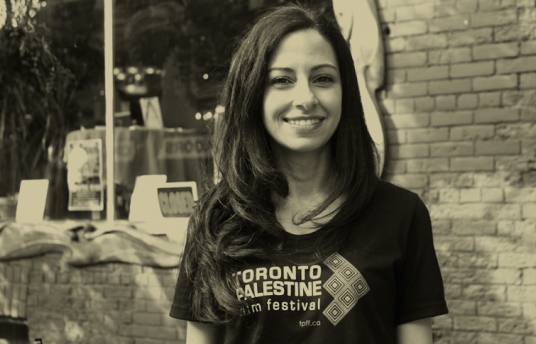People in Film: Dania Majid
Oct 02, 2012

Festival season is in full swing, from North America to the Middle East.
The fifth annual Toronto Palestine Film Festival (TPFF) in Canada is currently running and on until Sunday.
Programmer Dania Majid tells us how TPFF began, explains why Palestinians need to tell their own stories and predicts which filmmakers are about to enjoy the spotlight.
DFI: How did TPFF begin?
Dania: In 2008, a group of people held a discussion on how to commemorate the 60th anniversary of the Nakba in Toronto. Screenings of films on Palestine had been well-attended, so it was decided that a week-long festival featuring films about the Nakba and Palestinians in Palestine and diaspora would be a great away to tell rarely heard stories. There was a vacuum in Toronto around Palestinian and Arab arts and culture.
DFI: Everyone who puts on the Festival, including you, is a volunteer. What does it take to put it on?
Dania: There are around 10 committee members each year. Each is responsible for a core area like programming, promotions, volunteers, theatre and ticketing logistics, special events and fundraising. We meet once a week and have a great dynamic. This is how we’re able to put TPFF on with such limited resources.
DFI: What’s different about this year?
Dania: This is our most ambitious Festival. We’re hosting Marcel Khalife and the Al Mayadine Ensemble on closing night. Khalife is paying homage to the late Mahmoud Darwish by performing his poems in song.
DFI: How many films do you usually screen?
Dania: Approximately 25. Many are Canadian and North American premieres. We’ve screened critically acclaimed films including ‘Salt of this Sea’ and ‘Slingshot Hip Hop’, and lesser known films from up and coming directors such as ‘Arafat & I’.
DFI: Why is Palestinian cinema important?
Dania: As filmmaking technology becomes more accessible, a greater number of Palestinians are using film to tell their stories to a broader audience. While they might not be able to cross international borders, their stories in film can travel around the world. There are many great films about Palestine made by non-Palestinians, but it is very important that Palestinians access filmmaking to tell their own stories in their own voice.
DFI: What are the challenges?
Dania: Most Palestinian filmmakers are independent so it’s difficult for them to secure funds. There may be pressure from foreign funders to change their stories and make them more ‘western-friendly’. For projects filmed in Palestine, there is the added complication of navigating the occupation. Once shooting is over, there are added costs: post-production, trying to find a distributor and finding festivals to screen the film. Without a national film industry, many Palestinian filmmakers are forced to navigate this complicated process on their own and rely on outside sources for assistance.
DFI: Who have you got your eye on as the next big thing?
Dania: At Toronto International Film Festival this year, two great Palestinian filmmakers attended their world premieres – Annemarie Jacir and Mahdi Fleifel (‘A World Not Ours’). I expect great things from these filmmakers with these films and future projects. We’re pleased that others that have screened at past TPFFs are completing films too, including Cherien Dabis with ‘May in the Summer’.
DFI: What are the Festival’s greatest achievements?
Dania: In our first year, Suheir Hammad came to represent ‘Salt of this Sea’ in the first year, and Danny Glover came to the screening. Jackie Salloum closed with her amazing ‘Slingshot Hip Hop’. Both were premieres and enjoyed sold-out screenings.
In our second year, Michel Khleifi, a founding father of Palestinian cinema, attended with the Canadian premiere of ‘Zindeeq’.
We’ve also held several panels with great filmmakers including Ken Loach, Paul Laverty, and Ossama Bawardi.
DFI: Complete this sentence. The most important people for TPFF are…
Dania: …the audience. Without them it would just be empty rooms with films playing.